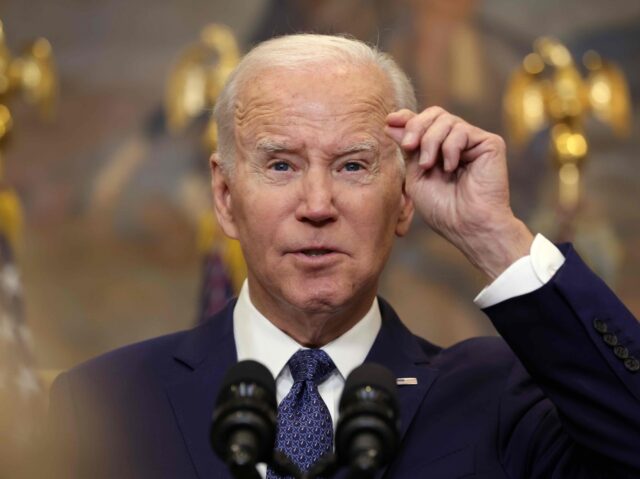President Joe Biden announced Wednesday that the U.S. would be sending 31 Abrams tanks to Ukraine, but did not explain to the American public what the purpose of the tanks would be, or the broader U.S. goal in the war.
White House communications chief John Kirby later tried to assure reporters (and Russia) that the tanks would not be used for an “offensive” purpose, but clearly the hope is to retake territory by attacking Russian forces.
The increasing involvement of the U.S. and other NATO allies in supplying — and advising — Ukrainian forces is an escalation that brings the West closer to outright conflict with Russia. And while the weakened Russian army would be no match for U.S. forces, the Russians still have the world’s largest nuclear arsenal — a fact that seems to have been forgotten amid the fashionable exuberance with which both parties have embraced the war effort.
I write — it is necessary to say this — as someone who has been a Russia hawk for many years, long before Putin rolled his tanks into Georgia during the 2008 Olympics.
Then-candidate Barack Obama emerged from a beach hut in Hawaii to mumble something about restraint on both sides, as if both Russia and Georgia were equally to blame. As president, he and Hillary Clinton pressed the “reset” button and abandoned Eastern Europe to Putin.
John Kerry, having invited Russia to return to the Middle East with a bogus deal on Syria’s chemical weapons, sputtered about Putin playing by “19th-century” rules as Russia easily conquered Crimea under Obama’s nose. But even that wasn’t enough to prod the Democrats to take a tough line.
Only the fantasy that Putin had helped Donald Trump win the presidency stirred Obama, Biden, and their party into 1980s-grade anti-Russia hysteria.
Still, when Biden took office, he fell back on the old strategy of appeasement, lifting Trump’s sanctions on the Nord Stream 2 pipeline — for nothing in return.
Putin interpreted that as a green light, and Biden’s belligerent posturing over the past year has partly been an effort to make up for his own blunders.
Gone and long forgotten are Biden’s declarations that “Diplomacy is back at the center of our foreign policy.” Now it’s heavy weaponry.
All well and good — to a point. The Russians failed to take Kyiv — thanks to the bravery of the Ukrainians, not to Biden, whose administration urged Ukrainian President Volodymyr Zelensky to flee rather than fight. American weapons helped Ukraine withstand the Russian advance in the eastern and southern regions, and even — at times — to regain territory.
The resulting stalemate produced the perfect opportunity for a peace settlement.
But Biden and Zelensky continue to press ahead. It is unclear why.
The U.S. foreign policy establishment seems to believe that the Russian military is near collapse, and that Putin may be forced from power. There is little thought given to what might happen to Russia afterwards — or how a Russian collapse would strengthen China.
There are also commercial interests at work: one hesitates to blame the “military-industrial complex,” yet here we are.
The best statement of war aims came from Kviy mayor and former heavyweight champion Vitali Klitschko, who wrote in the Wall Street Journal about how defeating Russia would boost American strength and interests.
Yet he did not provide a clear picture of what victory might look like. The Ukrainians say they want Russia off their territory; does that include Crimea? What about Russian-majority regions? There is no clear answer.
As long as the only cost to the U.S. is money, and while even Putin seems disinclined to use a nuclear option, the answers to these questions can be deferred.
But now there are other costs. The effort to arm Ukraine has depleted U.S. weapons stockpiles in South Korea and Israel. It has also emptied U.S. arsenals, as Byron York notes: “[T]he U.S., already underprepared for a major war, is running low on munitions for its own defense.”
There has been much talk about how the Russian military has been hollowed out by its invasion of Ukraine — and that remains the big story. But there has been little attention paid to the fact that the U.S. military, while not suffering direct casualties (yet), has also been weakened, at a time when recruitment is suffering.
Perhaps the president who ran on “diplomacy” should try to live up to his campaign promises — before it is too late.
Joel B. Pollak is Senior Editor-at-Large at Breitbart News and the host of Breitbart News Sunday on Sirius XM Patriot on Sunday evenings from 7 p.m. to 10 p.m. ET (4 p.m. to 7 p.m. PT). He is the author of the new biography, Rhoda: ‘Comrade Kadalie, You Are Out of Order’. He is also the author of the recent e-book, Neither Free nor Fair: The 2020 U.S. Presidential Election. He is a winner of the 2018 Robert Novak Journalism Alumni Fellowship. Follow him on Twitter at @joelpollak.

COMMENTS
Please let us know if you're having issues with commenting.